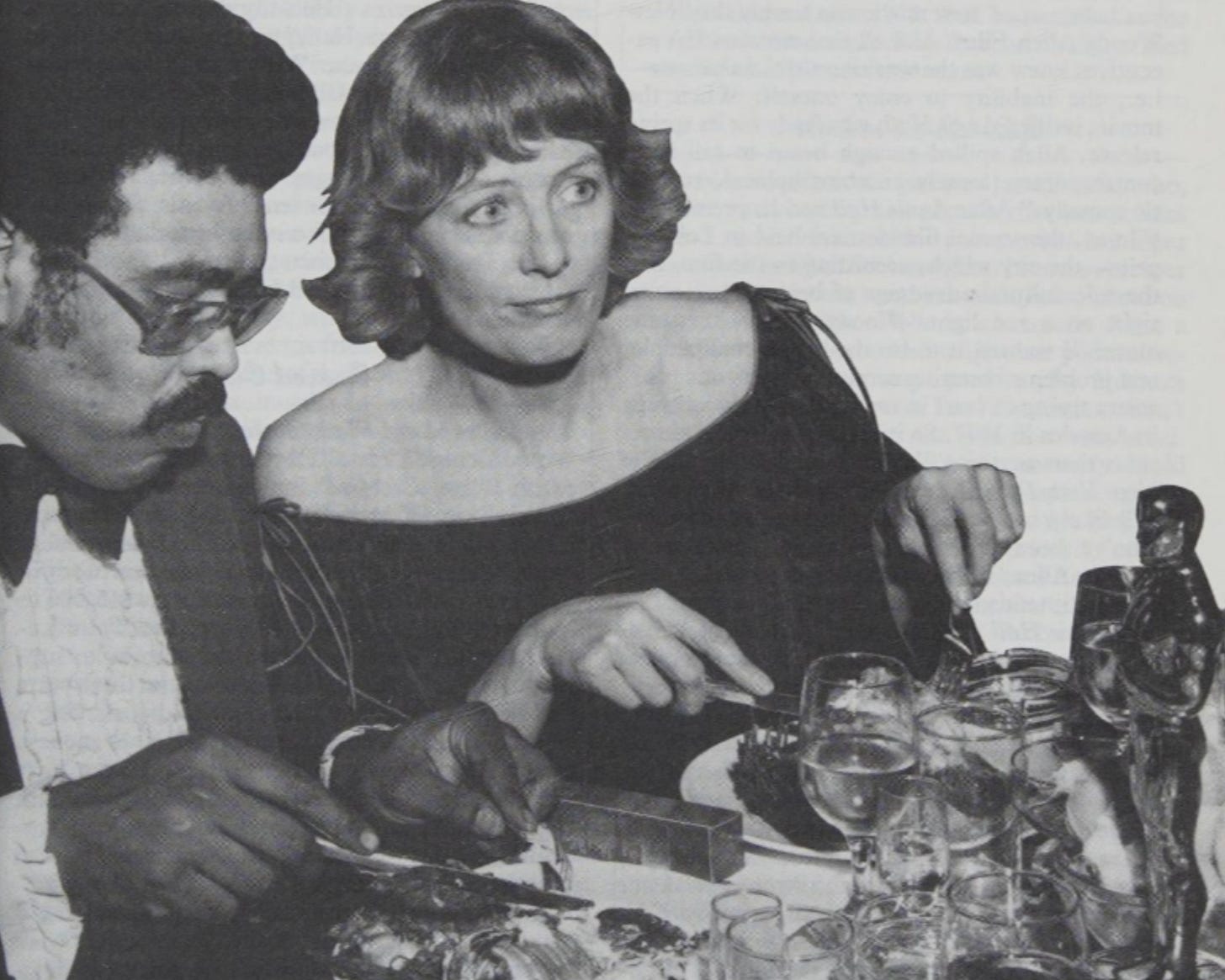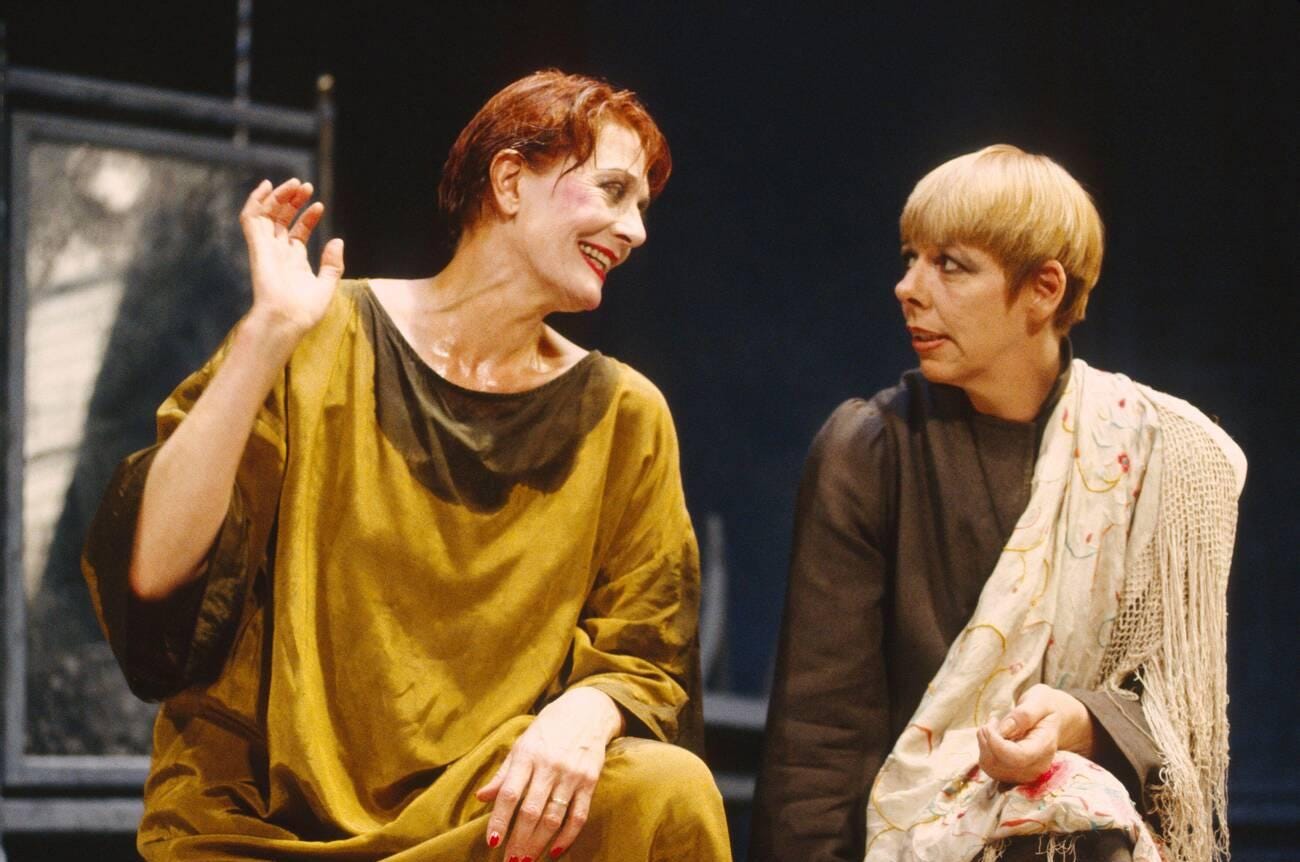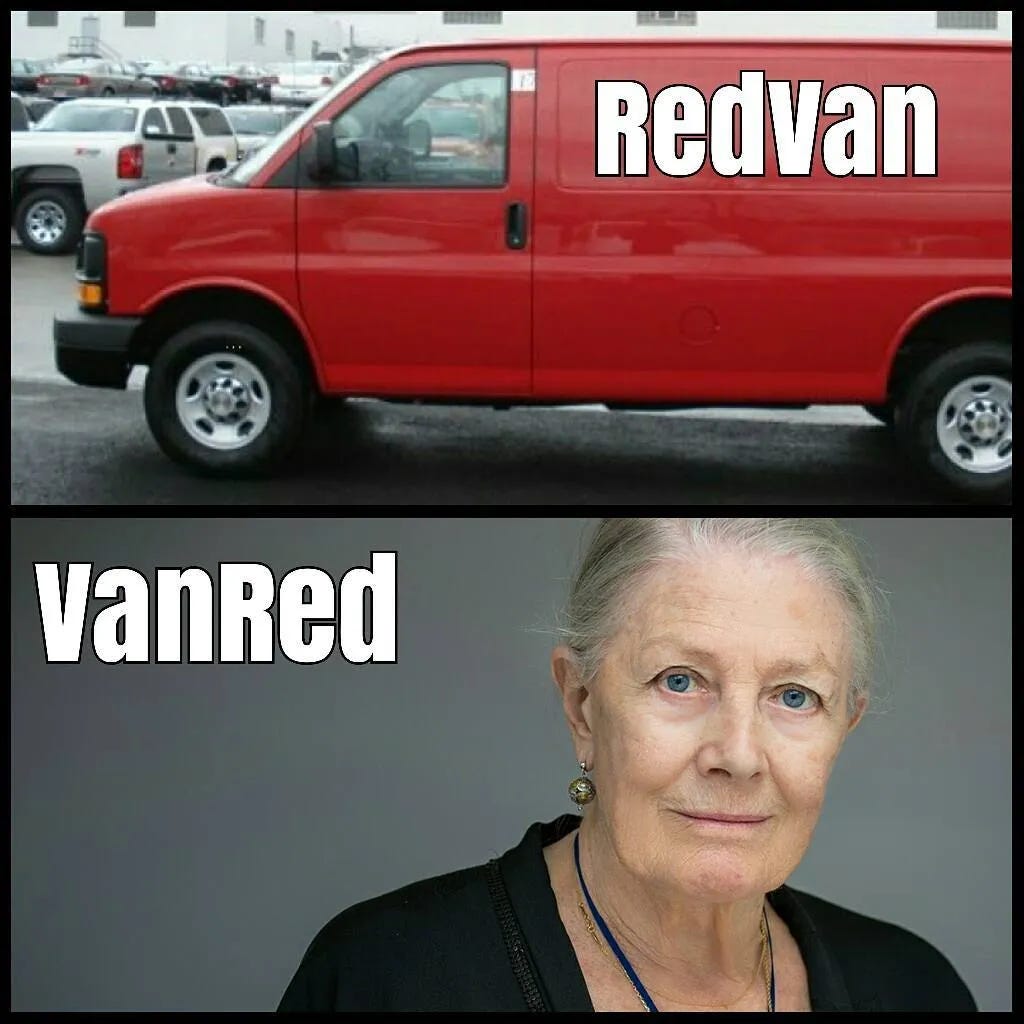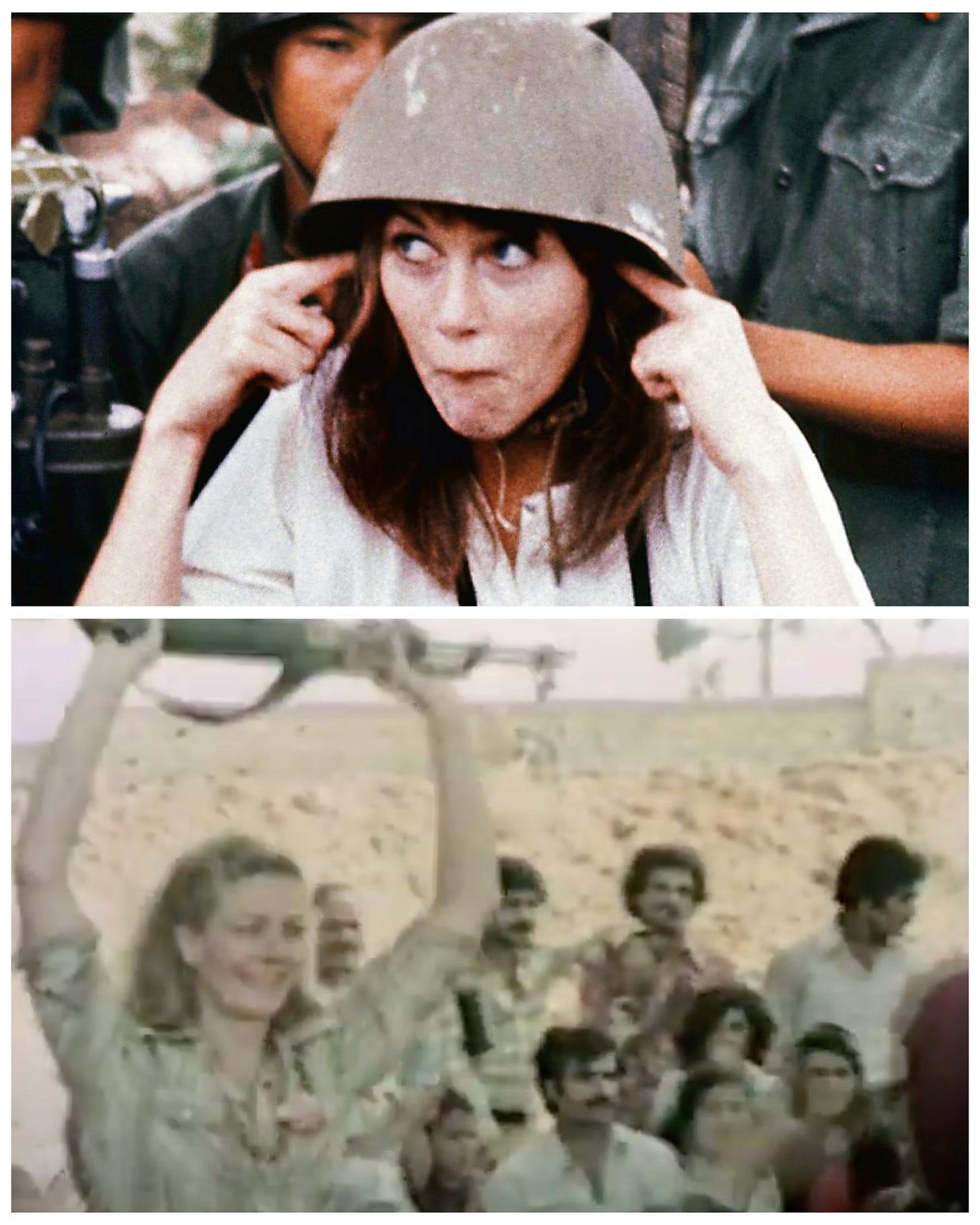Vanessa’s Varicose Veins (1977): For Good
Today’s Substack concludes our two-part dive into DAME VANESSA REDGRAVE whose towering craft and tireless activism often had disastrous consequences.
For Part I, click here.
“Sorry, are you Mark Donovan?”
I blanched. “There is an ‘O’ in there, you know. Like David O. Selznick.” Of course, I didn’t say that, but I often imagine doing so. Let’s face it, folk without the ‘O’ in Ireland tend to be members of the transient community – and the Grandfather would be rolling in his marble mausoleum, funded entirely by cleaning driveways, if we were lumped in with that lot.
A winsome man of my age stood before me. Oh, why do I run into fans when I’m perusing the goodie aisle at the supermarket and never in Fresh Fruit?
“I’m Al,” he beamed, extending an impeccably manicured paw “do I know you from Trinity?”
“I have no associations with That Place.”
Unfortunately, I did say that. Letting myself down with a bang. As per.
He flashed a wide smile. Middling teeth, I thought, for someone of his background. Grey. But flanked by stubble and a Clark Ga(y)ble ‘stache. Al could’ve been an Abercrombie model in his youth; Marks and Spencer’s best now displayed his come-to-bed paunch to perfection. It transpired that we took Theories of Literature together, back in the Cretaceous Era, although I can’t say I remembered him. We ended up having a lovely conversation. He looked like my dad in 1995 and, unlike him, seemed genuinely interested in me. I was besotted.
We had another, several days later, when I met Al and his husband – I caaahn’t stan’ two men styling each other thus, but I want to Keep In with them – walking their dogs in the neighbourhood “park”. Formerly a “field”, of course, when it belonged to doughty working class children; not trust fund glenntrifiers. And you know what? I wept after both encounters.
I’m normally invisible to guys like them.
“Rubbish!” my Vanessa Yellowtomb-loving pal from Borstal Two (you met him last week) scoffed. “You’re jealous of the set-up.”
And he’s right. Al grew up, a politician’s son, in the country’s wealthiest postcode. Although he lowered expectations to get himself on the property ladder. With a hefty endowment from the Bank of Mum and Dad, I’d imagine, if his makey-uppy job in the arts world is anything to go by. Cossetted in affirming milieus from the cradle. Al never saw people’s faces fall the second he opened his mouth, only to be told: “You didn’t learn to speak like that there”. I shouldn’t think he’s had a day’s worry since the Leaving Cert.
When I managed to get him alone, my brain worked overtime. Piecing together his illustrious friends and relations like some grand constellation of Redgrave-Richardsons. Oh, VanRed was attached to more men than Boy George’s radiator! Her open marriages to Tony Richardson (1962-1967) and Franco Nero (2006-) bracketed by a brood of beaux. Warren Beatty, Timothy Dalton, George Hamilton. And that’s just the “A through Hs”! Reaching the end of the alphabet (“S through Z”) in 1974, Vanessa had a liaison with Robert Stephens. When his hot-headed wife, the late Dame Maggie Smith, got wind; the actor was reputedly relieved of two teeth.
Al and I met for coffee.
Starbucks. I’m under sworn secrecy not to let it get back to his husband. Thank heavens! I’ve been sporting a swingeingly expensive porcelain molar since Christmas. Al’s partner Brendan is a paediatric nurse, old enough to be his father. What’s more, he’s the spokesbear for BDS. “Boycott, Divest, Sanction”, not what dyslexics call Dublin Business School.
I thought of Vanessa at the 50th Academy Awards. Neither her speech for Julia, nor its arch rebuttal by Paddy Chayefsky, mention the Palestinians by name. Failing Sam Rockwell and Frank McDormand reading the wrong Best Actress winner at the 2019 ceremony (I stopped marking the glenniversary of What Happened in 2022, when Russia’s “special military operation” in Ukraine superseded its importance), it’s the most politically-charged moment in Oscar herstory.
As opposed to the chiefly performative activism of today’s nominees – a necessary evil for admission into some sort of socially aware club – Vanessa’s sermon took guts. No bandwagon there! On the 3rd of April 1978, she was smuggled into the ceremony via underground ambulance. Protests over her nomination peaked with pickets outside cinemas, a boycott of 20th Century Fox, and VanRed-effigies set alight. There were even reports of mice being released into screenings of Julia. Snipers were stationed on the roof of the Dorothy Chandler Pavilion as members of the Jewish Defense League clashed with the pro-PLO (Palestinian Liberation Organization) contingent outside.
Not being an expert on Middle Eastern geopolitics, unlike “theatre-maker” Al or Nurse Brendan, it’s not my place to wade into the intricacies of the Arab-Israeli conflict. Nonetheless, here’s the SparkNotes version.
By the late seventies, Redgrave, ever a Pollyanna, proclaimed Palestine her new project. Even comparing PLO leader Yasser Arafat (or as my ma always called him: “Yasser Aromat”, after that half-seasoning, half-stock-powder thing) to Garibaldi, the hero of Italian unification.
In Paris, making Fred Zinnemann’s Julia with Jane Fonda, Vanessa befriended a Middle Eastern emigré. A survivor of the 1976 Tel al-Zaatar massacre – where thousands of Palestinian refugees were slaughtered in Beirut. She promised, there and then, to do everything in her power to bring his people’s suffering to the world. This wasn’t mere altruism, although she undoubtedly acted in good faith. For the cult-like Workers Revolutionary Party and its demagogue, Gerry Healy, VanRed proved a useful idiot.
The WRP, dissatisfied with trousering its rank-and-file with visions of a Marxist paradise in Britain, sought financial support from despotic Middle Eastern regimes – famously Libya’s Gaddafi. At the time I am speaking of now, their attention turned north-east. The communist historian Tim Wohlforth recalls: “Healy was the one to make that connection [to Palestine] and carry out that whole campaign. He was using her [Redgrave] because he was getting money from them”.
Vanessa remembered the day in May 1945 when a bedsheet was erected in Putney Market. Onto the makeshift screen, “a lot of black-and-white men kissing a lot of black-and-white women” darted. These images of VE Day left a profound impression on the eight-year-old. The power of documentary cinema! In response, one of Healy’s henchmen, director Roy Battersby, made The Palestinian in which Vanessa starred… And sold two of her houses to finance.
Watch Shirley MacLaine lampooning the imbroglio at the 1977 Royal Variety Show:
In her forty years, Vanessa perceived the world’s persecuted and dispossessed as sharing a collective experience. Similar to Jane Fonda, no one remembers her crusade’s nobler moments.
The Palestinian’s benevolent parts – Vanessa meeting noncombatants or Red Cross doctors – are forgotten. Her interviews with ruthless militia leaders (and Yasser Aromat himself!) stuck. And like Jane’s infamous pose on a Vietnamese anti-aircraft gun, Vanessa’s rifle-toting dance with the PLO is seared on everybody’s memory. In 2025, “Hanoi Jane” still follows Fonda; just as Vanessa’s “Zionist hoodlums” will haunt her forever.
It was April 3rd 1978. The Academy’s half-century was marked with a gala of lavish magnificence. (Can’t you imagine the self-conscious embarrassment with which they’ll approach the centennial in three years’ time? No other awards show is so hellbent on alienating the only people that give a fig about it as the Academy Awards.)
The producer of the fiftieth ceremony, Academy president Howard W. Koch, corralled a formidable list of presenters. Everyone from Fred Astaire to Bette Davis, Olivia de Havilland (at arm’s length from Joan Fontaine) to Barbara Stanwyck. Wags quipped that the only African-Americans in attendance were VanRed’s bodyguards! There were reps from New Hollywood, too. Jack Nicholson bestowed the top prize for the third of eight times. Annie Hall trumped Star Wars and the “women’s pictures” we’d have backed: Julia and The Turning Point.
To award the first Oscar of the night, a twenty-four-year old hunk strode onstage. Rocking a comically-large white collar and silk scarf to match, a lusciously-haired John Travolta was every inch the Saturday Night Fever star. His task? Presenting Best Supporting Actress.
“And the winner is Vanessa Redgrave in Julia.”
Here is an abridged version of her address:
I salute you and I pay tribute to you and I think you should be very proud that in the last few weeks you’ve stood firm and you have refused to be intimidated by the threats of a small bunch of Zionist hoodlums whose behaviour is an insult to the stature of Jews all over the world and to their great and heroic record of struggle against fascism and oppression. And I salute that record, and I salute all of you for having stood firm and dealt a final blow against that period when Nixon and McCarthy launched a worldwide witch hunt against those who tried to express in their lives and their work the truth that they believed in. I salute you, and I thank you, and I pledge to you that I will continue to fight against anti-Semitism and fascism.
The Dorothy Chandler erupted in gasps and boos, swiftly overtaken by applause. Two hours later, when presenting the writing gongs, the venerable Paddy Chayefsky fired back. “I’m sick and tired of people exploiting the occasion of the Academy Awards for the propagation of their own personal political propaganda. I would like to suggest to Miss Redgrave that her winning an Academy Award is not a pivotal moment in history, does not require a proclamation, and a simple ‘Thank you’ would have sufficed.”
In her Santa Monica home, Lynn Redgrave’s jaw dropped. Gosh, she must’ve thought, I moved halfway around the world to get away from this! Unlike her Trotskyist siblings (Corin was even more of a RED-grave), Lynn’s image was one of chintzy Americana. As wholesome as the Weight Watchers ready-meals she flogged in a series of memorable commercials. “Oh, oh,” she said, putting on a brave face for the guests at her Oscar viewing party, “here’s trouble.”
The other actresses in the room quickly leapt to her sister’s defence. “I like her!” Joan Hackett admired “one has to do what one has to do.” “She’s a very brave lady, and we mean that in a positive way,” added Karen Black.

The Governors Ball buzzed. The tension was so thick, hardly anyone noticed that the evening’s big winner, the Sean Baker of his day, was absent. (Woody Allen would fulfil his longstanding Monday “clarinet gig” on fifteen future Oscar nights – undeterred by the ceremony shifting to Sunday in 1999.) Moshé Mizrahi, the Israeli director of the Foreign Film winner Madame Rosa, was a surprising ally: “Basically, she’s right”.
“Chayefsky is a hypocrite,” young Mark Hamill puffed “anyone who castigates another person for exercising her right to free speech is making a political statement. Maybe you agree with him. But get it straight. He was pontificating. He was didactic. He was politicking”. Jack Nicholson, peering through his shades at liberal Luke Skywalker, deadpanned “I’m not very well read. What are Zionists? Are they Reds?”.
No matter how Vanessa tried to clarify her remarks, the damage was done. But she never backed down. She continued sacrificing her career for politics – at heartbreaking personal cost.
Her daughter Natasha adopted my custom of enjoying maudlin television dramas (The Waltons being her favourite) while double-fisting packets of chocolate digestives, and imagining the family she wished she had. And while Tash received a first-class education (“It just brings a different set of problems, Mark,” my shrink, a Mount Anville alumna, consoled), schoolyard titters still stung. Hearing variations on “your mum’s a Commie” every day leaves a lasting impact – even if it’s couched in the dulcet tones of South Kensington. Vanessa tried to soothe Natasha. “Our political struggle is for your future, and that of all the children of your generation. She looked at me with a serious, sweet smile: “But I need you now”.”
Nonetheless, Vanessa was unrepentant about her agenda. No regrets. “I didn’t realise pledging to fight antisemitism and fascism was controversial. I’m learning that it is.”
Would she do it again? In a heartbeat.
In her 2010 memoir, Mein Kampf, Patti LuPone paints an amusing portrait of VanRed’s contradictions. The champagne socialist who was ferried around London in a Rolls-Royce or Bentley. One assumes with a Lenin-cap, a budenovka, jauntily perched atop her crown. When Vanessa and another luvvie comrade, Frances de la Tour (“Frankie BLT” if you’re nasty), tried to wheedle Patti into performing at a Workers Revolutionary Party cabaret, they treated her to tea. Only to insist Ms. LuPone paid her share of the bill. “Down to the last pence!”
The WRP imploded in 1985. And “going clear” did much to soften Vanessa’s political stance, and bring her family back together. She continued to champion Palestinian self-determination while subtly moderating her stances. “All the great powers have an urgent interest in maintaining this conflict,” she lamented in 2012, expressing her wish to collaborate with Israeli artists who, in her view, were being excluded – “all of them”.
Patti LuPone’s recollections end on a tender note. She reunited with Vanessa in March 2009 to mourn Natasha Richardson’s tragic death in a skiing accident aged forty-five. Within fourteen months, Vanessa’s brother Corin and sister Lynn succumbed to lengthy battles with cancer. Their divisions, by then, were a distant memory.
“So, why did you drop out of English, Mark?” Al asked, shattering my Redgrave reverie in a fell swoop.
“I didn’t drop out!” I ejaculated. “I deferred.”
Muscle memory. That’s what the Mother made me tell people when I withdrew from That Place in 1916.
Al gave me a “Sorry for touching a nerve” look.
I stared down my overpriced Starbucks water bottle. (I didn’t want to embarrass myself by ordering the frozen-cherry slush or salted caramel frappe or whatever revolting concoction I’d have liked. Even though I got the drinks and didn’t Frankie BLT-him.)

“Oh, I don’t know,” I replied, shuffling my hands awkwardly “I was there one day and wasn’t the next. Every dog on the street hears this story.” I was about to make my “When the dogs start talking back, then I’ll get worried” joke, when he put his hand on mine and said he’d like to hear it.
“I just remember how lonely it was. I’d never even set foot in Trinity before I went there. If I found myself in that situation now, I’d be old and ugly enough to weather it. But I was just a stupid teenager.”
“I’m not blaming anyone but myself…” I continued, adding a good dose of the Mother’s “personal responsibility” into my soliloquy (and I hope you’re adding the pauses, hesitations and “you knows” I’m excising), “but I might as well have gone to the moon. I was so overwhelmed by it. So resentful. Of your– of that privileged milieu. And there was no leeway. It was: “The other students are dealing with it” or “You want everything handed to you” or “I don’t make the rules”, although they never told me what those rules were. I mean, I had earned a place. The fees were paid. I should’ve been allowed to do that course.” [I could hear the Mother’s “There’s no such thing as shoulds!”.]
Al’s sympathetic gaze pierced my soul. Relief. I can never distinguish between oversharing and vulnerability.
As he rhymed off old classmates and lecturers, names I hadn’t heard since the administration of Grover Cleveland (the first one!), something inside me cracked. A flood of emotion I’d buried. Wounds from a decade ago that sting like yesterday’s cuts. It’s why I cried the first time I met Al – even if my other friend pinned it on the green-eyed monster. (Borstal Bill thought my “invisible” line was the most self-indulgent claptrap he’d ever heard. “Grow up! The age of you.”)
But he was wrong. It wasn’t envy of Al’s suburban-semi or “career as an artist-practitioner” or even the steadying influence of his husbear. He’d dredged up sentiments I’d spent years suppressing: feelings everyone else – parents, friends, even the doctors and mediators and legal advisors I’ve consulted – dismissed as ancient history, too trivial to entertain. “You can’t change the past,” repeated by every last one of them like a profound epiphany.
“I had a bad experience on one of my four degrees,” the psychiatrist I mentioned earlier sniffed, “not my medical one or my Trinity one. I still have my vote for the Senate. And you don’t see me demanding closure and certainly not an apology. [I had “demanded” nothing.] But I often think of returning to that particular institution; going to the current students and telling them: I will help you take-them-down. But you? No, you need to put that in a box and Move On.”
On Saturday, I pulled out my phone to send Al a meme. Something daft about the Eurovision – which I loathe, but he’s a savant. (When he went to Malmö, last year, to celebrate his birthday; it was shrouded in such secrecy that you’d swear Brendan had gotten him in trouble and he was away getting “the boat”. That’s pre-2018 parlance for an abortion. In any case, his cohort’s calls for an Irish boycott fell on deaf ears.)
He’d unfollowed me on Instagram.
“Sorry Mark. I’m unfollowing every account that hasn’t posted about BDS. It isn’t personal.”
I stewed on that for a minute, before liking Al’s message and wishing him well. My Android pinged. A cascade of links and articles from the Ireland Palestine Solidarity Campaign flooded my DMs. His parting shot?
“Be more like your icon Vanessa Redgrave.”
I was halfway through texting “I’ll cancel the ski trip, you yuppie hoodlum” before I stopped in my tracks.
We should take his advice. Venerate Vanessa’s vigorous virtue.
There’s an old saying. “Anything for an easy life.” VanRed held her head high amid the jeers, the burning effigies, the rats in the aisles – standing for the truth she believed in. Despite every opportunity, like Al, to remain in cushy comfort. Oh, I’m boiling with bitterness towards the Als of the world. Their effortless belonging! And I hate myself for craving his approval – only to be discarded when my sob story served its purpose. It’s nothing to do with his honourable civic convictions. I share them! But I’ve yet to find one Dublin gay who has a good word to say about Al – though Brendan, with the patience of Job, is meant to be lovely.
Without veering into toxic positivity or slapping some false equivalence on an article that’s been as coherent as Adrien Brody’s Oscar speech, his exhortation remains sound. Vanessa, bucking bomb threats and blacklists, pressed on. Because it mattered.
We don’t need Al’s validation, nor That Place’s, nor anyone else’s.
We are Glennough.
Read Next in My Supporting Actress Series:
Hattie McDaniel’s Legacy (1939)
The Case for IBS: Why Isabella Rossellini Should Win (2024)
See Also:
Edmund Burke’s Reflections on the (Revolution in France) Oscar Nominations, 1955








